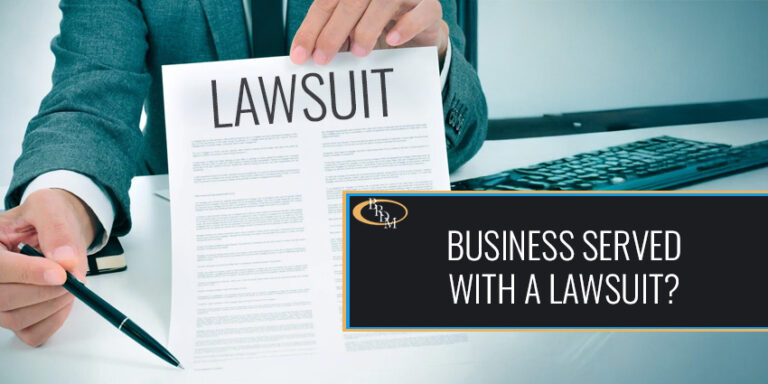Unexpected legal challenges can disrupt your business operations. Receiving a lawsuit can be stressful for any business owner. Whether it’s from a customer, employee, or another company, legal action can threaten your company’s finances and reputation. As a result, knowing the right steps to take can help protect your business and increase your chances of a favorable outcome.
At Battaglia, Ross, Dicus & McQuaid, P.A., our Florida business attorneys have guided countless businesses through legal disputes. This guide outlines the critical steps to take if your company is served with a lawsuit.
Table of Contents
- Stay Calm and Review the Lawsuit Carefully
- Understanding the Different Types of Business Lawsuits
- Notify Your Attorney Right Away
- Preserve All Relevant Documents and Evidence
- The Role of Insurance in Business Lawsuits
- Notify Your Insurance Provider
- The Lawsuit Timeline: What to Expect
- Determine Your Legal Response Strategy
- How to Handle Employee Reactions to a Lawsuit
- Do Not Ignore the Lawsuit
- Avoid Discussing the Case Publicly
- Consider Alternative Dispute Resolution (ADR)
- How to Minimize Business Liability in the Future
- Learn from the Experience to Prevent Future Lawsuits
- Why Expert Guidance from a Florida Business Attorney Matters
- Contact Battaglia, Ross, Dicus & McQuaid, P.A. for a Free Consultation
Stay Calm and Review the Lawsuit Carefully
First and foremost, remain calm. Panicking or acting impulsively can lead to mistakes that could hurt your case.
What to Do Immediately:
- Read the Complaint Carefully – Understand the claims made against your company.
- Check Deadlines – Lawsuits come with strict response deadlines, often within 20 days.
- Identify Who Filed the Lawsuit – Determine if it’s from a customer, vendor, employee, or another party.
- Do Not Contact the Plaintiff – Avoid discussing the case directly, as anything you say could be used against you.
Understanding the Different Types of Business Lawsuits
Businesses can face various types of lawsuits, each requiring a different legal approach. Therefore, understanding the nature of the claim can help you and your attorney determine the best response strategy.
Common Business Lawsuits:
- Breach of Contract – When one party fails to fulfill its contractual obligations.
- Employment Disputes – Claims involving wrongful termination, discrimination, or wage disputes.
- Intellectual Property Claims – Allegations of copyright or trademark infringement.
- Personal Injury Claims – Customers or employees suing due to accidents on business property.
- Fraud or Misrepresentation – Accusations of deceptive business practices.
Knowing what type of lawsuit your business is facing will help you work with your attorney to build a strong defense.
Notify Your Attorney Right Away
Contacting a Florida business attorney immediately is one of the most important steps you can take.
Why Legal Help Is Crucial:
- Attorneys Understand the Legal Process – They will explain your rights and responsibilities.
- They Help Build a Strong Defense – Your lawyer will review the claims and gather evidence to support your case.
- They Handle Court Filings and Deadlines – Missing a deadline can result in a default judgment against your company.
Ultimately, having legal representation early on can prevent costly mistakes and improve your chances of a positive outcome.
Preserve All Relevant Documents and Evidence
Evidence is key in any lawsuit. In addition, keeping thorough records can help strengthen your defense.
Important Documents to Gather:
- Contracts and Agreements – Any signed documents related to the dispute.
- Emails and Correspondence – Communications between your company and the plaintiff.
- Employee Records – If the lawsuit is employment-related.
- Financial Records – Proof of payments, invoices, or business transactions.
Make copies of all relevant documents and store them in a secure place.
The Role of Insurance in Business Lawsuits
Business insurance can provide financial protection when your company is sued. Having the right coverage in place can significantly reduce legal risks. For more information on business insurance requirements and how they apply to lawsuits, visit the Small Business Administration (SBA) website.
Business insurance can provide financial protection when your company is sued. Having the right coverage in place can significantly reduce legal risks.
Types of Business Insurance That May Help:
- General Liability Insurance – Covers injury-related claims and property damage.
- Errors and Omissions Insurance – Protects against claims of professional negligence.
- Cyber Liability Insurance – Covers legal issues resulting from data breaches and cyberattacks.
- Employment Practices Liability Insurance (EPLI) – Helps in cases of wrongful termination or discrimination claims.
Because of potential coverage benefits, if your business has insurance, notify your provider immediately. They may cover legal fees or provide an attorney to assist with your case.
Notify Your Insurance Provider
Many businesses have insurance policies that cover legal claims. Contacting your insurance provider as soon as possible is essential.
Types of Coverage That May Apply:
- General Liability Insurance – Covers claims related to injuries, property damage, and advertising issues.
- Employment Practices Liability Insurance (EPLI) – Protects against employment-related lawsuits.
- Professional Liability Insurance – Covers claims related to professional services or advice.
Your insurer may provide legal assistance or cover some of the costs associated with the lawsuit.
The Lawsuit Timeline: What to Expect
Understanding the legal process can help business owners know what to expect and how to prepare.
Typical Stages of a Business Lawsuit:
- Complaint Filing – The plaintiff files the lawsuit, outlining their claims against your company.
- Summons Served – Your business is formally notified and given a deadline to respond.
- Response Deadline – You must file an answer or a motion to dismiss.
- Discovery Process – Both sides exchange evidence, documents, and witness statements.
- Mediation or Settlement Talks – Efforts to resolve the case before trial.
- Trial and Judgment – If no agreement is reached, the case proceeds to court.
Consequently, working with a Florida business attorney ensures that each step is handled properly to protect your interests.
Determine Your Legal Response Strategy
After reviewing the lawsuit, your attorney will help you decide how to respond.
Possible Responses:
- File an Answer – A formal response admitting or denying the allegations.
- Motion to Dismiss – If the lawsuit lacks legal grounds, your attorney may seek to have it dismissed.
- Negotiate a Settlement – In some cases, settling outside of court can be more cost-effective.
- Prepare for Litigation – If the case goes to court, your lawyer will build a strong defense.
Each case is different, so discussing your options with an attorney is critical.
How to Handle Employee Reactions to a Lawsuit
When a business is sued, employees may feel uncertain about the future. Addressing their concerns can help maintain a productive work environment.
Best Practices for Managing Employee Concerns:
- Communicate Carefully – Provide only necessary information to avoid rumors and panic.
- Reassure Stability – Emphasize that the company is taking the right legal steps.
- Avoid Legal Discussions at Work – Employees should not speculate about the case publicly.
- Train Staff on Legal Risk Prevention – Educating employees on compliance can help prevent future lawsuits.
Managing the workplace response properly ensures the business remains operational and professional during legal proceedings.
Do Not Ignore the Lawsuit
On the contrary, ignoring a lawsuit will not make it go away. If you fail to respond, the court may rule in favor of the plaintiff by default.
Consequences of Ignoring a Lawsuit:
- Default Judgment – The court may award damages to the plaintiff without hearing your side.
- Frozen Business Accounts – The plaintiff could seek to collect money directly from your accounts.
- Property Seizure – In some cases, business assets may be taken to satisfy a judgment.
Even if you believe the claims are false, responding properly is essential to protect your business.
Avoid Discussing the Case Publicly
More importantly, discussing the lawsuit with employees, customers, or on social media can backfire. Anything you say could be used against you in court. To better understand defamation risks and public statements in business litigation, check out this Federal Trade Commission (FTC) guide.
Discussing the lawsuit with employees, customers, or on social media can backfire. Anything you say could be used against you in court.
Best Practices for Communications:
- Limit Discussions to Your Attorney – Keep all case-related conversations confidential.
- Train Employees on How to Respond – Ensure staff knows not to discuss the case with outsiders.
- Avoid Posting on Social Media – Public comments can be misinterpreted and harm your case.
Maintaining professionalism and discretion is key to protecting your business’s reputation.
Consider Alternative Dispute Resolution (ADR)
Not all lawsuits need to go to trial. Alternative dispute resolution methods, like mediation and arbitration, can save time and money.
Benefits of ADR:
- Faster Resolution – Cases can be resolved more quickly than traditional litigation.
- Lower Costs – Avoiding court can reduce legal expenses.
- More Control Over the Outcome – Negotiated settlements allow both parties to agree on a solution.
A Florida business attorney can help determine if ADR is a viable option for your case.
How to Minimize Business Liability in the Future
Preventing future lawsuits starts with proactive legal strategies. Implementing sound business practices can reduce legal risks.
Steps to Reduce Legal Risks:
- Review Contracts Regularly – Ensure all agreements are clear and legally sound.
- Conduct HR Compliance Audits – Prevent employment-related disputes by maintaining fair policies.
- Improve Documentation Practices – Keep thorough records of all business transactions and communications.
- Strengthen Cybersecurity Measures – Protect customer and employee data to avoid legal issues from data breaches.
- Consult a Florida Business Attorney for Ongoing Support – Regular legal checkups help identify potential risks before they escalate.
Taking these steps can help your company avoid costly litigation in the future.
Learn from the Experience to Prevent Future Lawsuits
Once the lawsuit is resolved, take steps to protect your company from future legal action.
Proactive Measures to Reduce Legal Risks:
- Review Contracts Regularly – Ensure all agreements are clear and legally sound.
- Train Employees on Compliance – Prevent workplace disputes with proper training.
- Improve Documentation Practices – Keep detailed records of transactions and communications.
- Consult an Attorney for Legal Audits – Regular legal checkups can help identify potential risks.
Being proactive can help safeguard your business from costly legal disputes in the future.
Why Expert Guidance from a Florida Business Attorney Matters
Lawsuits can be complex, time-consuming, and costly. Having a skilled attorney on your side ensures you’re taking the right steps from the start.
How an Attorney Can Help:
- Assess the Strength of the Case – Your lawyer will evaluate the claims and legal risks.
- Handle Legal Filings and Deadlines – Ensuring all responses and motions are submitted correctly.
- Negotiate Settlements – If a settlement is in your best interest, a Florida business attorney will advocate for favorable terms.
- Represent You in Court – If litigation is necessary, your attorney will fight for your business.
The right legal strategy can make a significant difference in the outcome of your case.
Contact Battaglia, Ross, Dicus & McQuaid, P.A. for a Free Consultation
If your business has been served with a lawsuit, don’t navigate the legal process alone. The experienced Florida business attorneys at Battaglia, Ross, Dicus & McQuaid, P.A. can help protect your company and guide you through every step.
Our firm has a strong track record of successfully defending businesses against legal claims. We understand the complexities of Florida business law and are committed to achieving the best possible outcome for our clients.
Contact us today for a free consultation. Let us provide the legal support you need to safeguard your business and future.



